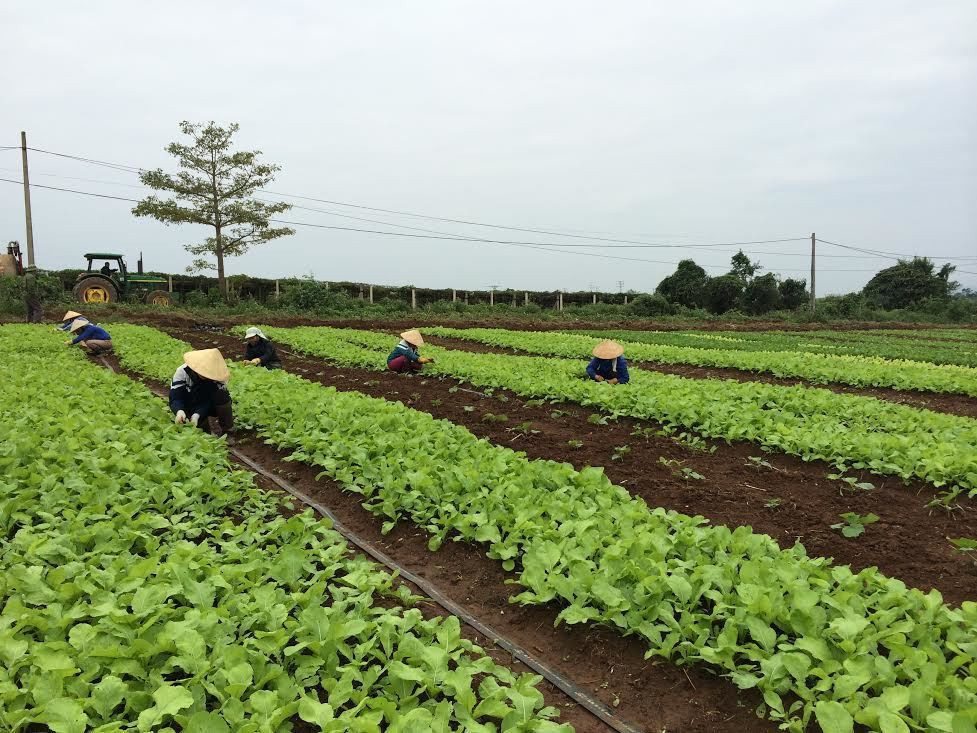
Vu Kim Hanh, Chair of the Vietnam High Quality Goods Business Association, said that the demand for organic farm produce is high and the number of organic shops have rapidly increased.
However, she is worried about the appearance of so many stores. Many people still don’t have a true understanding about ‘organic’. She said it is necessary to give a clear definition about organic production models.
Organic production must ensure the six ‘no's’ – no inorganic fertilizer, no plant protection chemicals, no herbicides, no genetically modified seeds, no growth stimulants and no chemicals in soil and water.
Experts have pointed out that many farm produce shops proclaim themselves as ‘organic’, while other shops introduce themselves as ‘oriented organic’, implying that their produce is grown in accordance with standards set for organic produce but they don’t have certificates.
As a result, consumers doubt the quality of produce at the shops.
Nguyen Minh Tien, director of Agriculture Trade Promotion Center, said consumers are more aware of the importance of organic produce for environmental and human health protection and creation of a sustainable ecosystem.
Organic produce sales in the globe increased by 15 percent to $129 billion in 2020 and $188 billion in 2021. The figure is estimated to reach $208 billion this year.
Consumers are striving for healthy meals and environmental protection. Value is expected to reach $437.36 billion by 2026.
In Vietnam, the organic agriculture land area has expanded to 174,000 hectares, an increase of 47 percent over 2016.
Vietnam is among the top 10 countries in Asia with the largest organic agriculture area and its organic export turnover is $335 million a year.
Paul Le, vice president of Central Retail, said surveys have found that organic produce is a consumption tendency.
It is expected that Vietnam will have 25 million people in the middle class by 2025, accounting for 25 percent of the population. They will want to buy use organic produce.
Le Khac Cuong, CEO of TH Group, which chose organic production in Vietnam very early, said it is costly to develop a standard organic product.
Because of historical factors, there are high levels of plant protection chemical residues, which makes the soil compact and the pH is low, just 3-4.
The company has to spend 5-7 years renewing impoverished soil to use it for production.
Meanwhile, during the production, if just one sample doesn’t meet requirements, the company has to start from the very beginning. The production cost is very high, which is a big challenge when developing organic produce.
Bui Hong Quan, vice president of Vinamit, said there are many difficulties enterprises face when developing organic produce, including the lack of specialists, highly qualified technicians, and investment capital.
The most important factor is fulfilling commitments on the quality of products.
Quan said that Vinamit still doesn’t have confidence in suppliers because they are not ensuring quality as was initially committed.
According to Bui Thi Hanh Hieu, CEO of Bao Minh Business Agricultural Products Processing JSC, many enterprises, including Bao Minh, have developed rice growing areas meeting USDA (US Department of Agriculture) standards for organic products, but their plants cannot meet the standards.
Therefore, they have to buy organic materials at prices that are 60 percent higher.
Nguyen Quoc Toan from the Ministry of Agriculture and Rural Development (MARD) said organic farm produce has special demand and branding. Enterprises need to build consumers’ confidence and improve production conditions and cooperate to develop business on a larger scale.
Tam An